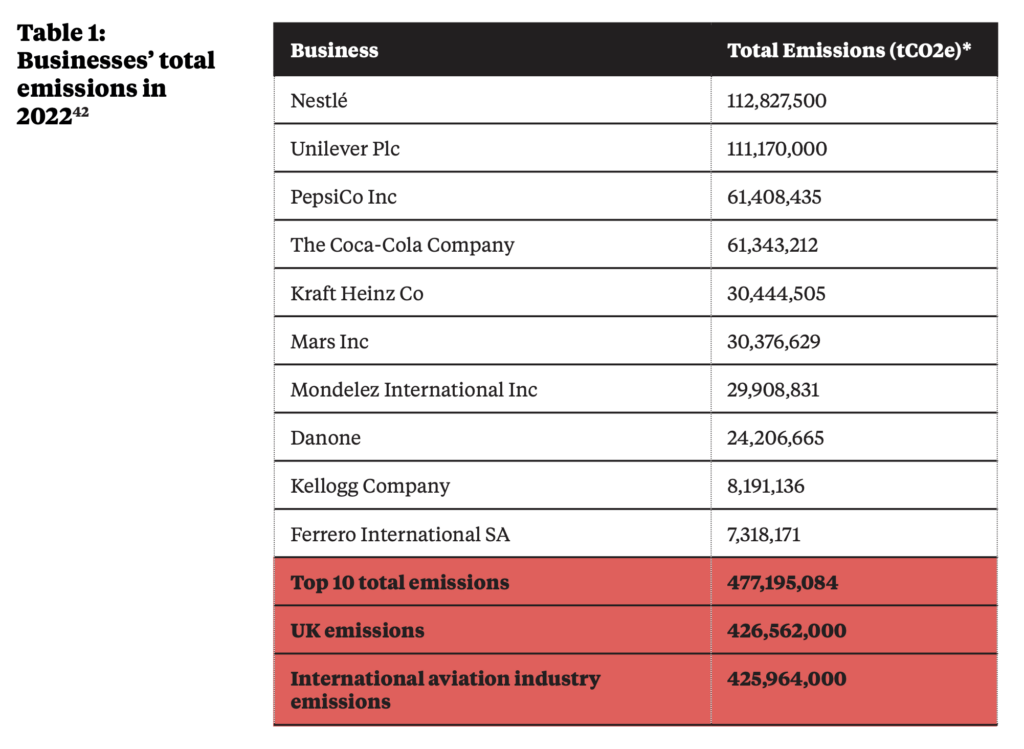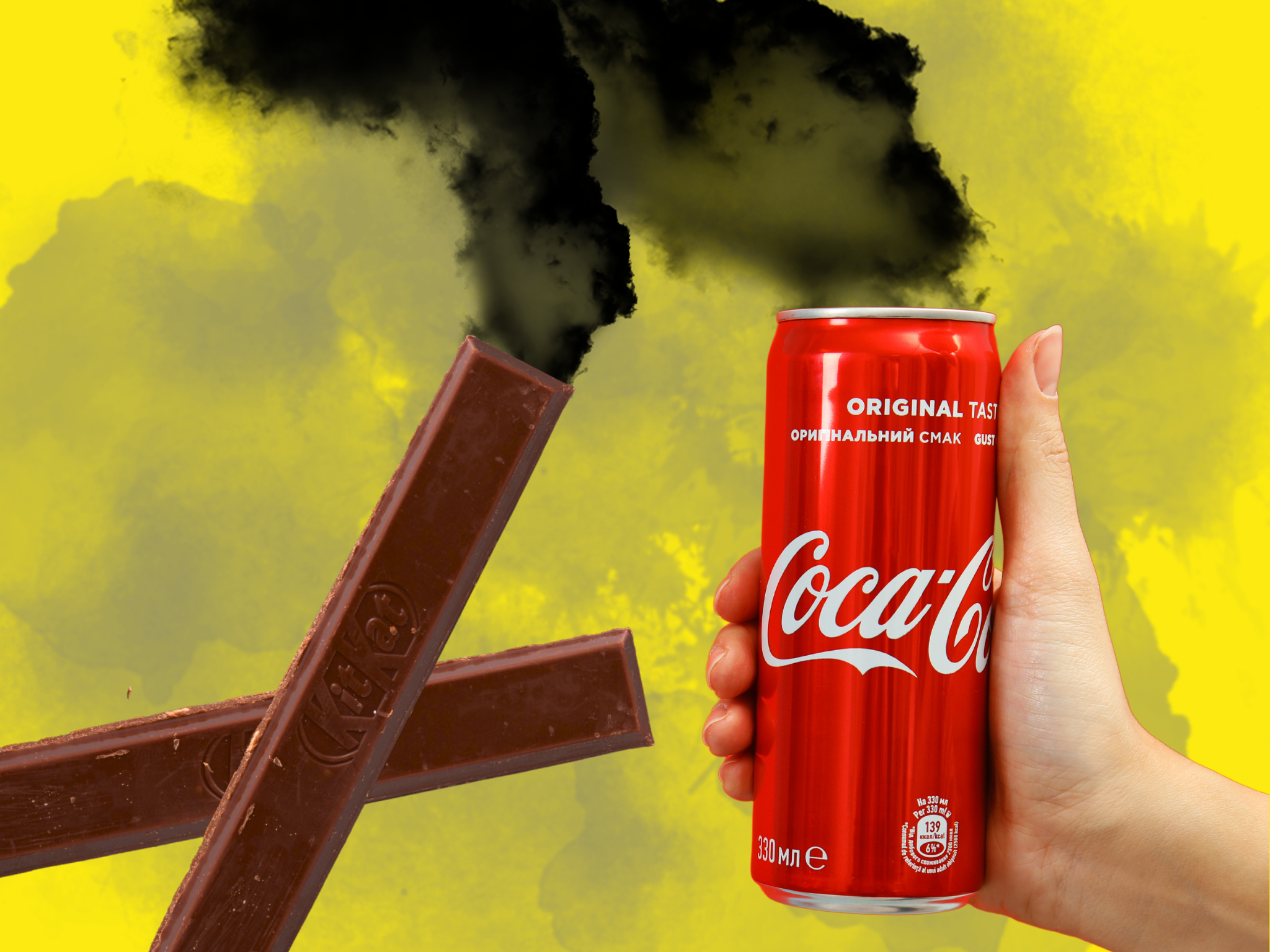UK’s Top 10 Food Companies Produce More Emissions Than the Entire Country: Report
5 Mins Read
The 10 largest food and drink producers in the UK are responsible for more greenhouse gas emissions globally than the entire aviation industry, new analysis shows.
Big Food is polluting the planet more than all the flights we take, and isn’t doing enough to curb its impact, according to a report by Bite Back, a British youth activist movement spotlighting the failures of the food system.
The global emissions of the companies responsible for producing more food than anybody else in Britain are higher than all of the aviation industry – and the UK itself.
In 2022, the UK’s top 10 products food and drink producers – Coca-Cola, Danone, Ferrero, Kellogg’s, Kraft Heinz, Mars, Mondelēz, Nestlé, PepsiCo and Unilever – emitted 477 million tonnes of CO2e globally. In the same year, both the world’s aviation sector and the UK as a whole generated 426 million tonnes of CO2e, Bite Back found.
The report was based on emissions data and short- and long-term reduction targets from the Science Based Targets Initiative (SBTi) dashboard. “Big Food is a major contributor to greenhouse gas emissions. Our investigations found that most businesses do not have ambitious enough climate targets,” said Bite Back CEO James Toop.
“Seeing big food companies use misleading claims about sustainability really upsets me. They’re only telling part of the story and hiding the full truth from the public. We’re endangering ourselves by not protecting the planet,” added Anna, a 17-year-old member of Bite Back’s Youth Board.

Most food giants have insufficient climate targets
Bite Back’s research revealed that despite setting short-term targets to reduce emissions by 2030, many of these goals are “not ambitious enough” to limit global heating to 1.5°C. Only four of the 10 businesses – Danone, Mars, Mondelez, and Nestlé – have SBTi-validated net-zero commitments for 2050.
Meanwhile, three of the companies’ targets are much lower than they should be for 2030. Instead of pledging to halve emissions, Coca-Cola has set out a goal to reduce them by 25%, Kellogg has a similar goal of 24%, and Mondelēz aims to curb emissions by 31%.
The report also found that seven of the 10 producers are not on track to reach their 2030 commitments. And Ferrero, Kraft Heinz and PepsiCo are moving in the opposite direction, having increased their emissions by 16%, 7% and 4%, respectively.
Moreover, Mondelēz and Kellogg only reduced their annual emissions between their base year and 2022 slightly, by 0.7% and 1%, respectively. Only Danone, Unilever and Coca-Cola appear to be on course (or close to it) towards their 2030 commitments, but then again, the latter’s target is half of what Bite Back suggests it should be (although it has slashed more emissions than the rest on the list).
Nestlé, the world’s largest food company, also had the largest global climate footprint, producing 112.8 million tonnes of CO2e. It was closely followed by Unilever, which emitted 111.1 tonnes in 2022. On the bottom end of the ladder was Ferrero with 7.3 million tonnes of CO2e. That said, both Unilever and Ferrero were called out for a lack of transparency in the data they provided.
“We’re always being told that ‘sustainability’ is something we have to do – ‘just recycle’,” said Reuben, an 18-year-old Bite Back member. “But while big food companies are pumping out these messages, they’re also pumping out millions of tonnes of methane.”

Big Food bites back
The report comes months after Bite Back found that seven of the world’s 10 largest food producers gain the majority of their UK sales from foods high in fat, sugar and salt (HFSS) that are marketed to children. As a step to lower this impact, the Labour government has announced a ban on junk food TV ads before 9pm.
A follow-up report in May uncovered the tactics deployed by junk food manufacturers to “manipulate children into craving unhealthy products”. This latest research is part of the same Fuel Us, Don’t Fool Us series, this time looking at environmental impacts.
While the UK has rescued emissions across its economy by over 30% since 2008, food emissions have dropped at less than half this rate, mainly from a lack of progress in decarbonising the farming sector. Bite Back cites research showing that dietary shifts aligned with the UK’s Eatwell Guide could help reduce greenhouse gas emissions by a third. To do so, people need to eat 30% more fruits and vegetables, 50% more fibre, 30% less meat, and 25% fewer HFSS foods.
The non-profit has made several recommendations to help bring about that change. It’s asking the national government to mandate the public reporting of sustainability metrics and sales of unhealthy food annually by businesses.
As for the manufacturers, they’re urged to set verifiable near- and long-term goals aligned with the Paris Agreement, commit to slashing total emissions in half by 2030, and publish transparent reports on their progress.
The Food and Drink Federation – which represents food giants in the UK, including most of the companies in the report – called Bite Back’s claims “misleading”, since the emissions mentioned are on a global level. (The report also acknowledges that not all emissions quoted come from food and drink, as some of the companies have a broader portfolio.)
“Around a quarter of the UK’s carbon emissions comes from the food we consume; however manufacturing only contributes 6% of this,” the group told the Guardian, notwithstanding the fact that these companies rely on agriculture for raw materials, an industry that accounts for at least 10% of the country’s greenhouse gas footprint.
“As a sector, we’re collaborating to minimise our environmental impact with our farm-to-fork commitment to achieve net zero by 2040,” the Food and Drink Federation added. “As the UK’s largest manufacturing industry, we’re keen to work in partnership with the new government to help drive the UK’s net-zero ambitions.”



